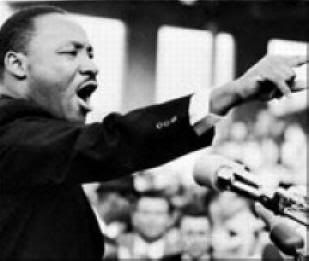Missing from the broadcast media is King in his final years, speaking out for the interests of the working class that the US foreign policy, then and now, contradicts:
[A]fter passage of civil rights acts in 1964 and 1965, King began challenging the nation's fundamental priorities. He maintained that civil rights laws were empty without "human rights" -- including economic rights. For people too poor to eat at a restaurant or afford a decent home, King said, anti-discrimination laws were hollow.Even today, after the deaths of 1525 US and other coalition soldiers and more than 100,000 Iraqis, only a minority of of the media consider what King would have said about the war on Iraq. As of 12:39 PM today, if you search Google News by keywords "martin luther king," the search returns 9,990 results, but if you look for "martin luther king iraq," you'll get only 948 results, and a search for "martin luther king vietnam" will give you a paltry return of 369 articles.
Noting that a majority of Americans below the poverty line were white, King developed a class perspective. He decried the huge income gaps between rich and poor, and called for "radical changes in the structure of our society" to redistribute wealth and power.
"True compassion," King declared, "is more than flinging a coin to a beggar; it comes to see that an edifice which produces beggars needs restructuring."
By 1967, King had also become the country's most prominent opponent of the Vietnam War, and a staunch critic of overall U.S. foreign policy, which he deemed militaristic. In his "Beyond Vietnam" speech delivered at New York's Riverside Church on April 4, 1967 -- a year to the day before he was murdered -- King called the United States "the greatest purveyor of violence in the world today."
From Vietnam to South Africa to Latin America, King said, the U.S. was "on the wrong side of a world revolution." King questioned "our alliance with the landed gentry of Latin America," and asked why the U.S. was suppressing revolutions "of the shirtless and barefoot people" in the Third World, instead of supporting them.
In foreign policy, King also offered an economic critique, complaining about "capitalists of the West investing huge sums of money in Asia, Africa and South America, only to take the profits out with no concern for the social betterment of the countries."
You haven't heard the "Beyond Vietnam" speech on network news retrospectives, but national media heard it loud and clear back in 1967 -- and loudly denounced it. Time magazine called it "demagogic slander that sounded like a script for Radio Hanoi." The Washington Post patronized that "King has diminished his usefulness to his cause, his country, his people."
In his last months, King was organizing the most militant project of his life: the Poor People's Campaign. He crisscrossed the country to assemble "a multiracial army of the poor" that would descend on Washington -- engaging in nonviolent civil disobedience at the Capitol, if need be -- until Congress enacted a poor people's bill of rights. Reader's Digest warned of an "insurrection."
King's economic bill of rights called for massive government jobs programs to rebuild America's cities. He saw a crying need to confront a Congress that had demonstrated its "hostility to the poor" -- appropriating "military funds with alacrity and generosity," but providing "poverty funds with miserliness."
How familiar that sounds today, more than a quarter-century after King's efforts on behalf of the poor people's mobilization were cut short by an assassin's bullet. (Cohen and Solomon, January 4, 1995)
It's still up to us to remember King as he really was. Let's listen to King's "Beyond Vietnam" speech again and commemorate his vision of a new world from exploitation and oppression of any kind by carrying on the work he bequeathed us.





No comments:
Post a Comment